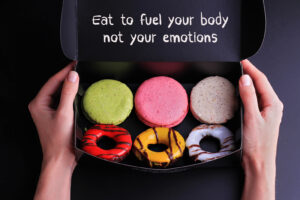Strategies for Handling Emotional Eating
One of the biggest challenges for many people trying to lose weight, or keep the weight off on a long-term basis, involves emotional eating. Emotional eating is when you eat foods, not for physical reasons, but use food in an attempt to address an emotional need.
According to a team of holistic health researchers: Segal, Segal & Smith, using foods to celebrate special occasions now and then isn’t going to be a major problem when it comes to emotional eating, it’s when you use food as an emotional coping mechanism that the problem begins.
There are indicators that can help you determine whether you’re eating because your body needs fuel or if you’re eating to satisfy an emotional need.
Physical hunger typically comes on more gradually. You may notice that your energy levels seem low and that your stomach feels empty. You may notice that you have trouble concentrating and may even be feeling a little irritable. With physical hunger, generally you’ll be more open to selecting a variety of food choices. Think about the last time you were hungry on a physical level. Everything sounds good, even those healthy vegetables and salads. Once when you have eaten enough to meet that hunger, need for further intake generally subsides. Usually we feel less guilty after we eat to satisfy hunger as compared to eating for an emotional need.
On the other side is emotional eating. Emotional eating comes on a more immediate basis. For example, the “I could really use a cheeseburger right now,” self talk. Emotional eating craves specific, usually comfort foods, like sugary snacks or things like pizza with your mind not being open to anything else. With emotional hunger, generally you won’t feel satisfied even when your belly is full.

Essentially food is being used in an attempt to “stuff down” your emotions. Unfortunately, no amount of food will be able to meet our emotional needs. As a result, we can frequently feel guilty which is the clearest indicator of emotional eating.
Fear not, there are many strategies you can employ to help limit emotional eating.
Feeling stressed? There is nothing better to counteract that anxiety than a great workout. Expend that nervous energy by going for a walk, run, or by squeezing a stress ball. You’ll not only feel better that you avoided emotional eating, but feel proud of yourself for doing the extra activity.
Feeling lonely? Drop the pint of ice cream and pick up the phone. Chatting with a friend or loved ones can help shake off those feelings of loneliness. Playing with a pet is also a great way to cheer yourself up, too.
Mindless eating? Create an environment that reduces needless distractions. This means turn off that TV and other devices that make you less aware of your intake. Eating with your non-dominant hand is also another great strategy that will help you eat more slowly and increase your awareness of your intake.
Knowing your emotional relationship with food can go a long way in improving both your physical and mental health. It is through increased awareness and thoughtful actions that you’ll achieve a better version of yourself in body, mind and soul.
Mark Connor
Certified Health and Wellness Coach
Genesis Personal Fitness

